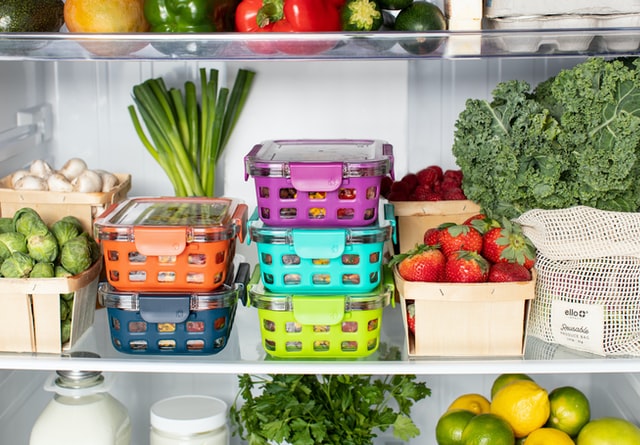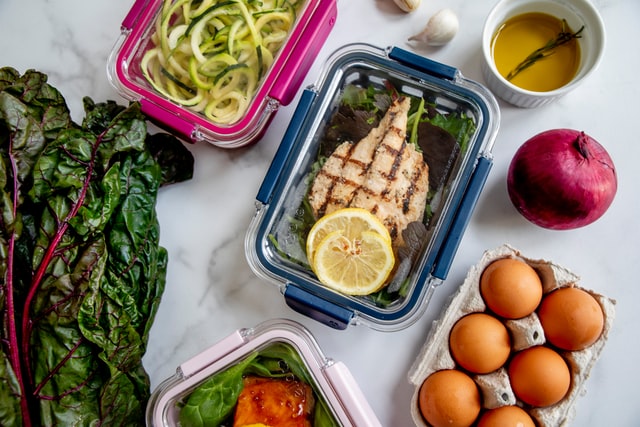
7 Awesome Benefits of Meal Planning and Prepping
Chances are you’ve heard someone mention meal planning or prepping before, and maybe you already do it. If you haven’t, these are great routines to add to any lifestyle.
First, let’s talk a little about meal planning and prepping, then we’ll dive into the benefits of incorporating these into your regular routine.
Meal planning can be a very simple process where you just write out the name of the meal or the ingredients you plan to use. Or it can be more complex where you are also calculating out the macros, portion sizes, and other details.
How detailed you get may depend on what your nutrition goals are. Some people plan for just a few days at a time, and others will plan out an entire week’s worth of meals. Do what works best for you.
You can adopt meal prepping habits that work best for you as well. For example, you might choose to prep all your meals on a Sunday for the first few days of the week and then do another batch of cooking/prepping on Thursday to cover the rest of the week.
Alternatively, you might choose to prep just certain components of your meals such as baking several chicken breasts or hard-boiling multiple eggs to use over the next few days and cooking your vegetables at the time of the meal.
For those of you who don’t like to reheat previously cooked foods, that’s ok! Because food prep doesn’t have to include cooking. You can prep salads ahead time, minus any cooked items you may add later. Tip: don’t add the dressing until time to eat or your salad will get soggy.
You can also prep vegetables by chopping and portioning out how much you will need for each meal; you can do the same with your raw meats. This way the ingredients are all set to good in the right amounts when you’re ready to cook them. If you go this route, the biggest caution I would give is to not have raw meats sitting in the refrigerator for more than a couple of days. You want to make sure your ingredients remain fresh. So, what you can do is freeze your raw meat portions, and then thaw them in the refrigerator as you need them.
Whichever way you choose to incorporate meal planning and prepping, I know you’ll love the benefits that come along with it. Let’s take a walk through those benefits.
Saves Time
Sure, you’ll spend some time upfront when doing your planning and prepping, but in the long run it can save you time during the week. When mealtimes come, you already know the plan, so you can get started cooking without any delay of trying to figure out what you want.
And as an added bonus: if you have already prepped food ahead of time, then you are simply reheating (if needed) and serving the meals. Even if you have part of the meal prepped and have to cook the rest of it, you will still save time compared to what it would have taken to cook the entire meal completely in that moment.
Saves Money
Let’s be honest: the cost of eating meals from restaurants adds up quick! According to an article from Business Insider, Americans tend to eat meals from restaurants about six times per week, and when they broke down the average cost of menu item in each state, it was typically in the range of $10 – $12. This works out to $60 – $72 per week spent on just six meals for one person. That’s $240 – $288 per month! And we all know the cost of many restaurant meals is much higher than $12.
For $60 in a week, you can easily pick up enough groceries to prepare more meals and incorporate more variety into each of them. Below is an example of some recent foods I purchased and the cost for each. You can see just how much more food I was able to buy with the same $60.
Example:
- 18 pack of free-range eggs = $7.99
- 1 package of uncured bacon = $5.59
- 1 large pack of chicken breasts (total of 7 with a couple big enough to be two servings) = $23.11
- 2 packages of prepared salad mixes = $7.98
- 1 package of asparagus = $3.99
- 1 bottle of salad dressing = $1.88
- 1 zucchini and 1 yellow squash = $2.28 total
- 1 package of frozen steam-in-bag brussels sprouts = $1.19
- 2 avocados = $4
- 2 1-gallon jugs of water = $1.96
Total spent in this example: $59.97
Note: I’m not including taxes /fees/ tips/etc in this as those can vary by person, location, and whether you do your own shopping or have items delivered. But this gives you an idea of the difference in amount of food a grocery run compared to six restaurant meals.
Lowers Food Waste
Another way to save money is through lowering how much food you waste. Think about it, every time you throw away food, you are essentially throwing out the money you spent on that food. Would you take a wad of cash, crumple it up and toss it in the garbage? I doubt it. But that’s exactly what we are doing.
And food waste is a huge problem! The National Consumer Panel site shares information that the average family of four in America throws away about $1,500 in food every year! Unfortunately, the “costs” extend to more than just money with numerous environmental issues caused by wasted food as well.
Now, I’m not suggesting anyone eat food that has obviously gone bad. We don’t need to make ourselves sick. But by planning your meals, you can ensure you use all of the food you purchase by incorporating multiple ingredients across several meals.
For example, if you purchase a pack of mushrooms for a particular meal you want to make, plan out how else you can incorporate mushrooms into your other meals. This way you don’t end up with half a pack of mushroom sitting in your fridge until they go bad.
Less Stress
When you already know what you’re going to eat, you don’t have to worry about trying to figure it out. Ta-da!
This is especially helpful if you happen to get to the point of being “hangry”. I can’t tell you how many times I’ve been in this position where I didn’t have anything planned for dinner, and I ended up so irritated that I just ordered food from somewhere. And usually regretted it later. Or even worse, found myself two hours later, with still not having eaten and even more frustrated.
Well, not anymore.
Instead of getting frustrated and giving in to ordering food that either costs you more money or isn’t as healthy as you would prefer it to be, you can easily avoid all of that stress by having your meal already planned and prepped.
Keeps You On-Track
When talking about keeping you on-track, this is in regard to your nutrition goals. Perhaps the goal is a certain style of eating, maybe you calculate out the macros you want to hit each day, or it could be just that you want to make healthier food choices.
Whatever your goals are for your eating style, having meals planned and prepped out allows you to better stay on top of those goals. If you are trying to make eating habit changes, it’s so easy to slide back into old habits when you’re in a crunch. And then people often get frustrated that they strayed from their goals. Take that out of the equation for yourself by planning out your meals.
Gives You Control
When you are in charge of planning and preparing your own meals, you get to control exactly what goes into them.
Things you can control with meal planning:
- Portion size
- Grams of Fat/Protein/Carbs
- Total calories
- Whether the food is organic/pasture-raised/ free-range /non-GMO/sustainably sourced/etc.
- Seasonings that get used
- Additives or preservatives that might be used
Meal planning allows you to know what is going into your food, and what you are getting out of it.
Involves the Family
If you’re planning meals for a family, this is a great opportunity to get their input on what they would like to have. Of course, if you have someone who suggests ice cream sundaes for dinner every night, you may have to exercise your vetoing skills.
Involve them in the preparation process as well. Involving people gets them more excited. People like to have a voice in what’s happening. Family meal planning and preparation is an excellent opportunity to bring the family together.
For younger kids, you can take this as time to teach them about different foods and food groups, and they can do smaller tasks in the kitchen to assist with meal prep. Older children and teens can learn how to prepare and cook different foods as is age appropriate.
Learning new cooking skills can give them a sense of accomplishment because they are contributing to meals the family enjoys. Plus, it’s great for growing teens and young adults to learn how to manage meals before they end up out on their own.
So those are some of the awesome benefits you can get from choosing to incorporate meal planning and/or prepping into your regular routine. I highly recommend you do this. It just makes mealtimes so much easier, and if you are working on specific food goals, it can definitely help you achieve them.





